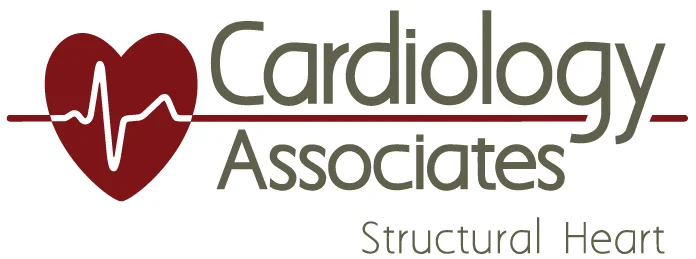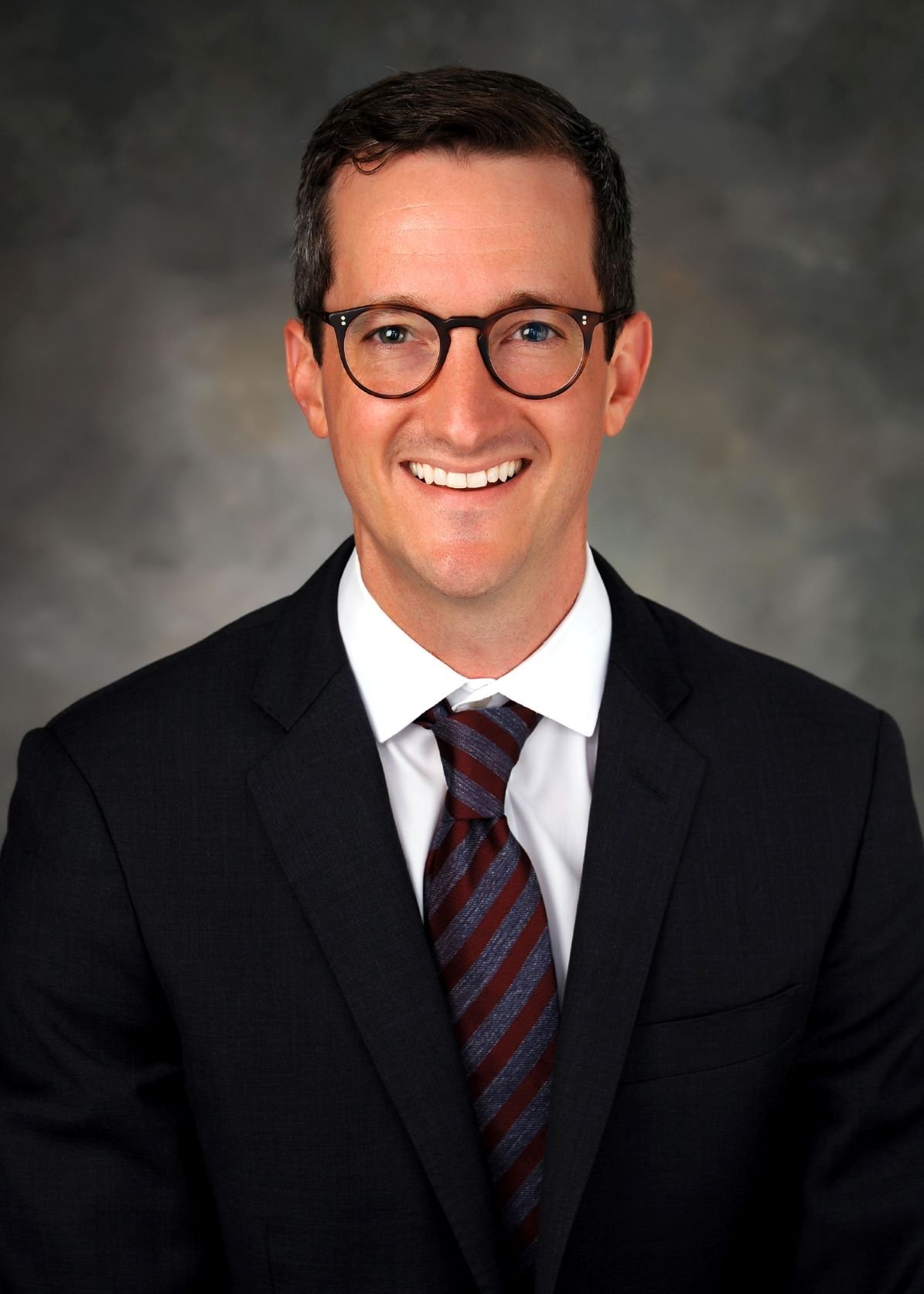The Structural Heart Team at Cardiology Associates strives to provide the latest treatment options to patients in the area with structural heart disorders. Several minimally invasive treatment breakthroughs are available to patients who may not be candidates for open heart procedures or who may benefit from the recent technology to treat conditions such as aortic stenosis, mitral valve regurgitation, atrial fibrillation, patent foramen ovale or an atrial septal defect.
About Aortic or Mitral Valve Disease
Valve Disease is very common, more than five million Americans are diagnosed each year and unfortunately it can go undetected for many years. The symptoms develop slowly and do not typically present themselves to the patient until later onset of the disease, which at this point may be advanced.
Stenosis (abnormal narrowing) or regurgitation (leaking) in the heart valves causes the heart to work harder and if left untreated, may lead to heart failure. The heart has 4 valves that keep blood flowing from the heart in the right direction. The four valves are the mitral, aortic, tricuspid and pulmonic valves. The mitral and aortic valves are the most frequently affected by valvular disease.
The aortic valve governs blood flow between the heart and the aorta and thus the vessels to the rest of the body. Severe aortic stenosis is when the blood flowing out of the heart is hampered and the valves of the aorta won’t open and close properly.
Mitral Valve regurgitation occurs when the two leaflets, or flaps, in the mitral valve do not completely come together allowing blood to flow backwards into the left atrium. This backwards flow can place a burden on your heart and lungs and over time cause the heart to become enlarged and weakened resulting in the development of congestive heart failure. With the onset of heart failure the weakened heart works overtime and cannot pump enough blood out to the bodies vital organs.
Diagnosing Aortic Stenosis, Mitral Valve Regurgitation or Valvular Heart Disease
The symptoms are at times undetectable or can go unnoticed. Typically valve disease advances slowly and the heart may adjust and one may not notice the onset of symptoms. Many of the symptoms are similar to those with congestive heart failure which are shortness of breath, swelling of the hands, feet, ankles or abdomen, palpitations, mild chest pain, fatigue, dizziness or fainting.
The cause may be congenital (present at birth) or may develop over a period of years. Valve disease or damage to heart valves can also be attributed to a heart attack, atherosclerosis and high blood pressure, endocarditis (an infection of the inner lining of the heart muscle and valves), Rheumatic fever or heart tissue may degenerate with age.
An echocardiography study is often used when evaluating a patient for valvular disease which is an ultrasound of the heart and provides important information on the structure and function of the heart muscle and valves.
In addition to an echocardiography study, a cardiopulmonary function test (CPX) will be ordered. The CPX helps determine how the heart and lungs work together and determine any cause of fatigue. A cardiac PET scan or cardiac CT may also be ordered which will provide a superior image of both the anatomical structures within the body and the metabolic activity occurring in those structures. At times a cardiac catheterization may also be necessary in identifying valvular disease.
Aortic Valve Replacement
In the past, the procedure to repair or replace a heart valve involved open heart surgery and at times there are patients, especially those that are elderly or frail, where an open heart procedure is not recommended. In these instances, Cardiology Associates is the leader in the region in the minimally invasive treatment of valvular heart disease. Cardiology Associates brings together a professional collaboration of experts in interventional cardiology, cardiothoracic surgery, clinical technology and nursing to perform minimally invasive valve replacement or repair procedures that are performed through a catheter.
Following the FDA’s approval of TAVR for the treatment of patients with inoperative aortic valve disease in late 2011, Cardiology Associates was one of a select few heart teams in the United States to first offer TAVR to patients with aortic valve disease. Nearly 8 years later, this innovative valve therapy continues to offer improved quality of life to residents on the Gulf Coast with severe aortic stenosis. The Structural Heart Team at Cardiology Associates has performed over 400 replacement procedures and TAVR is quickly becoming more and more the standard for aortic valve replacements in patients with aortic stenosis.
Transcatheter aortic valve replacement or TAVR, is a innovative and minimally invasive procedure to replace the old or damaged valve with a replacement valve in its place. This procedure is also referred to as transcatheter aortic valve implantation, TAVI or AVI.
Mitral Valve Repair
Treatment for degenerative mitral regurgitation depends on how severe the condition may be, and if it's getting worse. The goal of mitral regurgitation treatment is to improve your heart's function while minimizing your symptoms and avoiding future complications. If open-heart mitral valve surgery is not an option for you—due to your age, advanced heart failure, or other serious medical conditions—you may be eligible for a less-invasive treatment option called transcatheter mitral valve repair.
Transcatheter Edge to Edge Repair or TEER is performed using the Mitraclip(R), treating patients with mitral valve regurgitation who are not surgical candidates for mitral valve repair or replacement.
For both TAVR and TEER, to ensure optimal patient results, our multi-disciplinary team uses state-of-the art hybrid catheterization labs, supported by the hospital’s highly trained staff to offer this cutting edge technology to the patients of the Gulf Coast.
Left Atrial Appendage Closure (LAAC)
An interventional procedure typically appropriate for patients with Atrial Fibrillation (AFIB) who are on blood thinning medication. A left atrial appendage occluder device is a minimally-invasive catheter-based umbrella-shaped, self-expanding device that seals off the left atrial appendage in the heart, where blot clots tend to form, reducing the risk of stroke. It provides patients with an alternative opposed to the lifelong use of blood-thinning medications which in many patients can be prohibitive due to noncompliance, long-term bleeding, or occupational restrictions.
Patent Foramen Ovale (PFO) / Atrial Septal Defect (ASD)
These procedures are performed via catheter to permanently close a heart defect such as a hole in the heart or for patients with Atrial Septal Defects, ASD, or Patent Forum Ovale, PFO. Once in place, the mesh device is deployed in proximity on both sides of the septal wall, creating a platform for tissue in-growth, or allow for tissue to grow over mesh thus closing the hole in the septum. Use of this device aids in symptom improvements, increased exercise capacity and risk for ischemic stroke.
Transcatheter Aortic Valve Replacement
Watch the video to view an animation showing an aortic valve replacement for patients with aortic stenosis using the transcatheter aortic valve.
Mitral Valve Repair / Replacement
Watch the video to view an animation showing an mitral valve repair using the MitraClip®.
Why have open heart surgery for aortic stenosis when there’s a less invasive option? Cardiology Associates patient Evelyn Knowles shares her TAVR experience.
Left Atrial Appendage Closure
Watch the video to learn of the benefits of the Watchman™ device for patients on long term blood thinners and the closure of the left atrial appendage of the heart.
THE STRUCTURAL TEAM
Structural Heart Coordinators
Heather Beasley, RN, BSN
Ashley Cain, RN, BSN
Tenesha Chestang, LPN
Teresa Eiland
Liaison
Jamie Harrell, RN, BSN
Melanie Williams, RN
Request an Appointment
If you need immediate medical assistance, please call 9-1-1. We cannot accept emergency requests through this online appointment form.
We know how important it is for you to get your appointment scheduled promptly. To schedule an appointment, please call 251-340-6852, Monday through Friday from 8:00 a.m. to 5:00 p.m. or complete the form below. A representative will contact you within 24 hours or the following business day to schedule your appointment.
If you are an established patient of Cardiology Associates, you may also request an appointment online through our Patient Portal. In the portal you can also request a prescription refill, submit questions and provide updated information.
We understand schedules can change so should you need to reschedule or cancel your scheduled appointment please call at least one day in advance so we can give your time to another patient. If due to unforeseen circumstances, you cannot give 24 hours’ notice, please call as soon as you know you will be unable to keep your appointment. If you miss an appointment for any reason, please do not come into the office without first rescheduling another appointment.




















